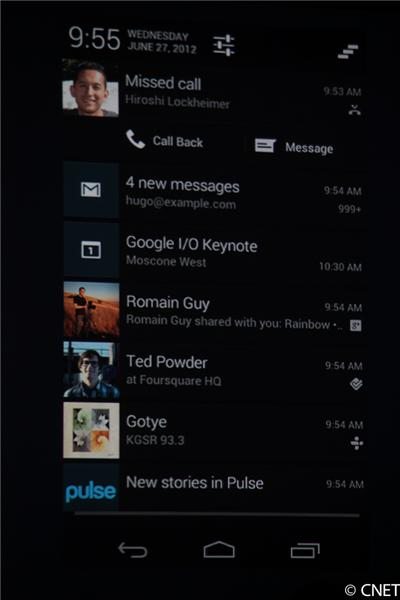Google unveils Android 4.1 Jelly Bean

Google has outlined its latest version of Android, code named Jelly Bean. There's a bevy of upgrades to improve performance, a few smart search tools, better voice features and "a bunch of delightful improvements".

Jelly Bean
(Credit: CNET)
The features are notable on many fronts, but the contrast between Google's geeky approach to Android compared to the pizazz of Apple and its iOS pitch is stark.
These features, which will be delivered in mid-July to Galaxy Nexus and Xoom users, break down like this:
Search results appear in "cards" that package information in an easy view. These cards can be swiped away later and look like packaged apps
The notification bar will now include social streams, sports scores, calendar dates, flight statuses, recommendations and other key items
Smarter search will be via Google Now, a feature that highlights traffic statuses and predictive time of arrival
Improved photo applications
Near-field communications (NFC) and Android Beam improvements
Offline voice typing
Keyboard improvements, including an algorithm that guesses the next word before you type.
Will any of these new features and upgrades to Ice Cream Sandwich, the last Android release, win over new converts? Probably not.
But Google doesn't have to win over new users. It only has to keep current Android customers on the platform. Google's Android market share is more than 50 per cent, according to comScore. Sure, new phone buyers have a decision between an Android device and Apple's iOS (which has nearly 30 per cent share according to comScore), along with Windows Phone or BlackBerry, but Google only has to keep you.
If you're already an Android phone user, you're likely to stick with the platform and these features. Even though few folks have the latest Android, older phones will see Jelly Bean as a nice leap forward. That leap could probably fend off iOS in many cases. Contrast Google's approach to what Microsoft needs to do with Windows Phone; Microsoft has to win customers with leapfrog features and a new interface. So far, Microsoft hasn't been successful in terms of market share. Simply put, Microsoft has a larger hurdle to clear.
Android's improvements show development maturity — most of Jelly Bean revolves around slight upgrades — and the fact that Google has a comfortable lead. Google doesn't have to change your mobile world anymore; it just has to improve it, so you'll stick around.
Via ZDNet US